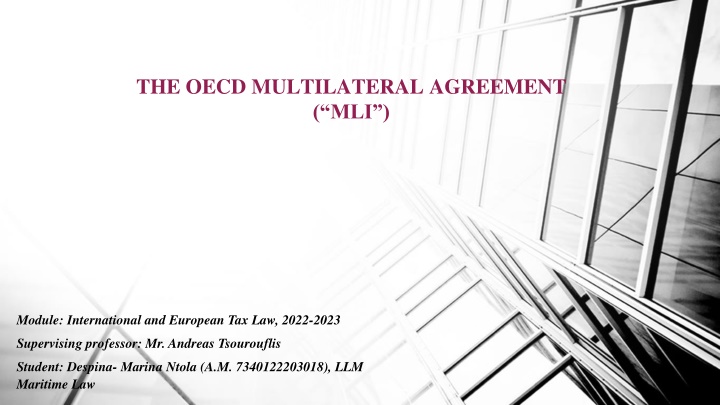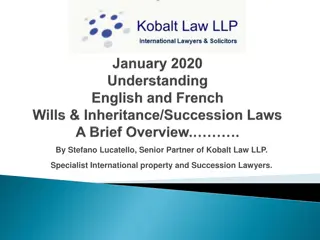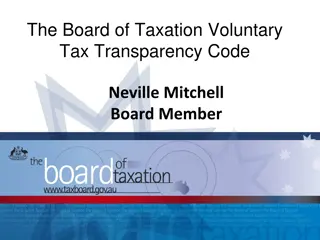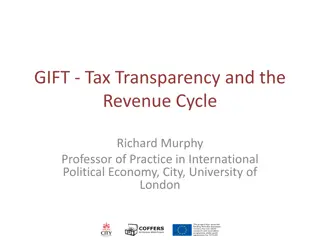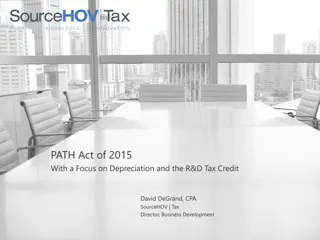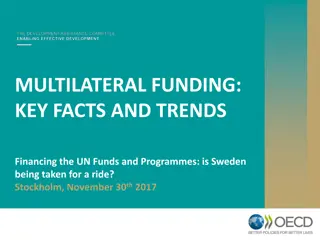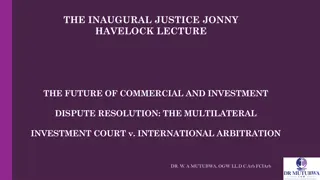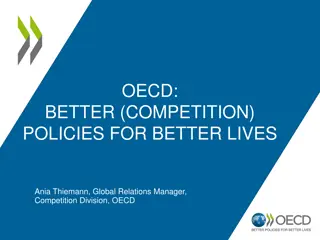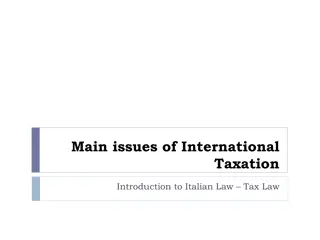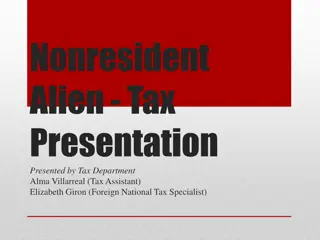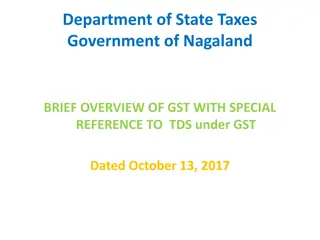The OECD Multilateral Agreement: International Tax Law
OECD Multilateral Agreement (MLI) in International and European Tax Law for the 2022-2023 academic year. Delve into the historical background, BEPS Project, MLI flexibility, main provisions, and more. Discover how the MLI aims to prevent profit shifting and tax base erosion through tackling gaps and mismatches in tax rules.
Download Presentation

Please find below an Image/Link to download the presentation.
The content on the website is provided AS IS for your information and personal use only. It may not be sold, licensed, or shared on other websites without obtaining consent from the author.If you encounter any issues during the download, it is possible that the publisher has removed the file from their server.
You are allowed to download the files provided on this website for personal or commercial use, subject to the condition that they are used lawfully. All files are the property of their respective owners.
The content on the website is provided AS IS for your information and personal use only. It may not be sold, licensed, or shared on other websites without obtaining consent from the author.
E N D
Presentation Transcript
THE OECD MULTILATERAL AGREEMENT ( MLI ) Module: International and European Tax Law, 2022-2023 Supervising professor: Mr. Andreas Tsourouflis Student: Despina- Marina Ntola (A.M. 7340122203018), LLM Maritime Law
CONTENTS. I. INTRODUCTION/ HISTORICAL BACKGROUND II. THE PROBLEM/ BEPS PROJECT III. MULTILATERAL CONVENTION TO IMPLEMENT TAX TREATY RELATED MEASURES TO PREVENT BEPS FLEXIBILITY OFTHE MLI A. COMPATIBILITY CLAUSES B. RESERVATION CLAUSES C. NOTIFICATION D. RATIFICATION OFTHE MLI AND MLI POSITIONS E. IV. MLI MAIN PROVISIONS. Hybrid Mismatches (Articles 3-5) 1. TreatyAbuse (Article 6-11) 2. Avoidance Of Permanent Establishment Status (Articles 12-15) 3. Improving Dispute Resolution (Articles 16-17) 4. Mandatory BindingArbitration Mechanism (Articles 18-26) 5.
I. INTRODUCTION/ HISTORICAL BACKGROUND Multilateral Convention to Implement Tax Treaty Related Measures to Prevent BEPS (hereinafter called the MLI ) was one of the results of the OECD/G20 Project to tackle Base Erosion and Profit Shifting (the BEPS Project ), i.e., tax planning strategies that exploit gaps and mismatches in tax rules to artificially shift profits to low or no- tax location where there is little or no economic activity. The negotiations on the MLI were concluded in November 2016 and the first signing ceremony was held on 7 June 2017, during which 68 countries, including Greece, signed the MLI, while other countries expressed their intent to join in the near future. As of 16 December 2022, 100 countries have signed the MLI, while 79 countries have already deposited their Instrument of Ratification, Acceptance or Approval. Algeria, Eswatini and Lebanon have expressed their intent to sign the Convention. Greece deposited the Instrument of Ratification on 30.03.2021 and entered into force on 01.07.2021, by virtue of the Greek L. 4768/2021.
II. THE PROBLEM /BEPS PROJECT BEPS refers to the tax base erosion and profit shifting resulting from unintended gaps and mismatches between different countries tax systems that can be used by the multinational enterprises to conceal their profit for tax purposes or to shift profits to jurisdictions where there is no or very limited real activity and without or with low taxes, which results in little or no corporate tax being paid. . Tax treaties between two countries, were designed to prevent double taxation by setting specific rules for the tax calculation method. However, tax treaties in many cases resulted the opposite NON- TAXATION. DOUBLE According to conservative estimations, 4-10% of the global corporate tax revenues is lost from BEPS or USD 100-240 Billions. The OECD/G20 BEPS package published in October 2015, contains 15 Actions, aiming to tackle the BEPS problem.
III. MULTILATERAL CONVENTION TO IMPLEMENT TAX TREATY RELATED MEASURES TO PREVENT BEPS ( MLI ) The MLI, allows governments to modify existing bilateral tax treaties, so as to implement the tax treaty measures developed during the BEPS Project, without the need to renegotiate each existing tax treaty. Covered TaxAgreement: tax treaties which are covered by the MLI (CTAs). The MLI contains rules for: 1. Hybrid mismatch arrangements (Action 2 of the BEPS Project). 2. Prevention of TreatyAbuse (Action 6 of the BEPS Project). 3. Prevention of the Artificial Avoidance of Permanent Establishment Status (Action 7 of the BEPS Project). 4. Improvement of dispute resolution (Action 14 of the BEPS Project). BEPS measures, and in specific Actions 2,6,7 and 14, as same were adopted during OECD/G20 negotiations, were implemented by the Convention.
CHARACTERISTICS OF THE MLI A. FLEXIBILITY. Each Contracting Jurisdiction may accommodate the adopted measures in various ways. How? Each Contracting Jurisdiction specifies the tax treaties to which the Convention applies (the Covered Tax Agreements ). a. Jurisdictions can choose amongst alternative provisions in certain MLI articles. b. Jurisdictions can choose to apply optional provisions (for example, on Mandatory BindingArbitration). c. Jurisdictions may choose to reserve the right not to apply MLI provisions ( reservation ). d. B. COMPATIBILITY CLAUSES. Compatibility clauses define the relationship between the provisions of the MLI and the Covered Tax Agreements, considering that many of the provisions of the MLI overlap with the provisions of the Covered Tax Agreements, either in conflict or not. The Contracting Jurisdictions shall notify the Depositary the (Secretary-General of the OECD) on any relevant provision in the Covered TaxAgreement which is to be affected . 4 types of compatibility clauses: Provision of the Convention applies a.) in place of b.) applies to or modifies c.) in the absence of d.) in place of or in the absence of an existing provision of a Covered TaxAgreement.
C. RESERVATION CLAUSES. Provided that a provision of the MLI does not reflect a minimum standard, a Party has the discretion to opt out of applying particular provision to their Covered Tax Agreement, either in general or to a subset of Covered Tax Agreements, in order to preserve existing provisions that have specific, objectively defined characteristics. Each article specifically sets out the permitted reservations. As follows from Article 28(1) of the MLI, reservations are expressly permitted in relation to 27 provisions of 21 Articles. When a Party makes one or more such reservations, these reservations are applied to the Covered Tax Agreements between the reserving Party and all Contracting Jurisdictions. D. NOTIFICATION. Each Party shall make various notifications to the Depositary, for example for the existing tax treaties which will constitute Covered Tax Agreements, for the application of alternative or optional provisions, for the application of provisions that supersede or modify specific types of provisions existing into the CTAs, for the reservations. Reservations and notifications shall be made to the Depositary at the time of signature or when depositing the instrument of ratification, according to theArt. 28 par. 5 and 29 par.1 of the MLI. E. RATIFICATION. In order, each Contracting Jurisdiction to incorporate the MLI into its domestic legislation, the national procedures for the ratification of the MLI must be preceded (Art. 27 par. 2 MLI). Following the ratification of the MLI, each Contracting Jurisdiction shall submit before the Depositary the MLI Positions. The MLI Positions provided for each jurisdiction upon the deposit of the instrument of ratification, acceptance or approval and/or signature. This document contains the list of reservations and notifications.
IV. MLI MAIN PROVISIONS 1. HYBRID MISMATCHES (ARTICLES 3-5 MLI) PROBLEM: the national tax systems are not coordinated and as a result legal concepts may have different meanings in different states and taxpayers can take advantage of these mismatches in their tax planning, which may result double non taxation. Article 3 of the MLI deals with the income derived by or through transparent entities. Income derived by or through entity or arrangement that is treated as wholly or partly fiscally transparent under the tax law of either contracting jurisdiction shall be considered to be income of a resident of a Contracting Jurisdiction. Article 4 of the MLI deals with the situations of dual residence for taxpayers other than individuals. The goal is to ensure that a taxpayer shall be considered a resident of only one Contracting Jurisdiction. Contracting Jurisdictions, by means of a mutual agreement procedure, shall determine the Contracting Jurisdiction of which the taxpayer shall be deemed to be a resident for the purposes of a Covered Tax Agreement. Criteria for determining the jurisdiction entitled to tax are the place of effective management, the place of incorporation or constitution and any other relevant factors. Article 5 of the MLI modifies the double- tax-relief article of existing treaties in order to avoid double non- taxation because of the application of the exemption method, i.e., the exemption of a taxpayer from the tax in its resident country or jurisdiction regardless of where income is generated. The article provides three (3) options: (next slide)
First Option: The 1stoption provides the application of the credit method, according to which the source state applies the provision of an existing tax treaty to exempt income or to limit the rate at which that income may be taxed. In that case the residence state shall allow as a deduction from the tax, an amount equal to the tax paid in the other Contracting Jurisdiction. Second Option: The 2ndoption also provides for a switchover to the credit method, but same is limited to the cases that the residence state would exempt a payment from the tax, because it considers same as dividend, whereas the source state, considering the payment, as interest allows a deduction for the payment under the domestic law. Third Option: The 3rdoption provides the replacement of the exemption method with the credit method in the tax treaties which provide in their double-tax-relief article the exemption method. It is worth mentioning that the provisions related to hybrid mismatches do not constitute a minimum standard, so Contracting Jurisdictions may opt out these provisions. Greece has opted out of the provisions concerning hybrid mismatches (art. 3-5).
2. TREATY ABUSE (ARTICLE 6-11 MLI) These provisions reflects BEPS minimum standard, meaning that the Contracting Jurisdiction cannot opt out same. Article 6 requires the modification of the Covered Tax Agreements so a to include in their preamble text a wording clarifying that the purpose of the tax treaty is not only to eliminate double taxation, but to fulfil that purpose without creating opportunities for non- taxation or reduced taxation through tax evasion or tax avoidance (including treaty shopping arrangements). Article 7 of the MLI contains the so-called Principal Purpose Test (PPT). The PPT provision provides that treaty benefits shall be denied if it is reasonable to conclude, having regard to all relevant facts and circumstances, that obtaining that benefit was one of the principal purposes of any arrangement or transaction that resulted directly or indirectly in that benefit... . In addition, Article 7 contains an optional Simplified Limitation on Benefits (LOB) clause, which provides that most treaty benefits shall be denied to taxpayers, other than individuals, unless such other taxpayers fulfil one number of criteria, so as the companies, which are not engaged in the active conduct of business not to take advantage from any treaty benefit.
3. AVOIDANCE OF PERMANENT ESTABLISHMENT STATUS (ARTICLES 12-15 MLI) Permanent establishment generally means a fixed place of business such as place of management, an office or a factory. The work on Action 7 of the BEPS Project led to changes to the definition of permanent establishment to prevent the artificial avoidance of permanent establishment status in relation to BEPS. In accordance with the Article 12 of the MLI an enterprise is deemed to have a permanent establishment in a Contracting Jurisdiction, when a person acting in that Contracting Jurisdiction on behalf of the enterprise and habitually concludes contracts or plays the principal role to the conclusion of contracts (the provision provides a list of requirements for the definition of the permanent establishment). Article 13 contains activities, which are excluded from the permanent establishment status (Activities of preparatory or auxiliary character in relation to the main activity of the enterprise). Article 14 is intended to reduce the opportunities for avoiding permanent establishment status by splitting up the activities performed in the Contracting Jurisdiction on several closely related enterprises. Article 15 describes the conditions under which a person will be considered closely related to an enterprise for the purposes of Articles 12-14. Greece has reserved the right not to apply the set of provisions relevant to PE status in its CoveredAgreements.
4. IMPROVING DISPUTE RESOLUTION (ARTICLES 16-17 MLI) Articles 16-17 of the MLI reflect the minimum standard for improving dispute resolution. Tax treaties provide a mechanism through which Contracting Jurisdictions may resolve differences or difficulties regarding the interpretation or application of tax treaties on a mutually- agreed basis. During the work on BEPS Action 14, jurisdictions agreed on a minimum standard and a number of best practices with respect to the dispute resolution. The minimum standard will ensure that treaty obligations related to the mutual agreement procedure ( MAP ) are fully implemented in good faith and that administrative processes promote the prevention and timely resolution of treaty- related disputes. MAP has one weakness: it does not require the parties to resolve the dispute, but only to use their best efforts to do so; same results many MAP procedures to remain unresolved.
5. MANDATORY BINDING ARBITRATION MECHANISM (ARTICLES 18-26 MLI) does not reflect a minimum standard and is an optional provision. When the Contracting Jurisdictions opt in the Mandatory Binding Arbitration Mechanism into the existing tax treaties, the parties, in defined circumstances are obliged to submit unresolved MAP cases to an arbitration panel. The MLI provides for two alternative arbitration approaches: the final offer approach (which is the default) and the independent opinion approach. Under the final offer approach, each Contracting Jurisdiction presents its own proposed resolutions, and the arbitrators choose their preferred outcome. Under the independent opinion approach, the arbitrators make their decisions based on their analysis of the information provided. Under the independent opinion approach, each competent authority must provide to the arbitration panel any information that the panel may consider necessary to reach its decision. The decision of the arbitrator will be binding on the parties to the treaty. Greece has chosen to apply this mechanism, with some reservations however, for example, the two-year period is replaced with a three- year period for the completion of the aforementioned procedure Greece has opted only for independent opinion arbitration.
BIBLIOGRAPHY/ SOURCES Explanatory statement multilateral convention to implement tax treaty related measures to prevent BEPS. 1. MLI frequently asked questions. 2. Information Brochure multilateral-instrument BEPS. 3. Kleist, David, Nordic tax journal, 2018 Issue: 1 Page: 31-48, The Multilateral Convention to Implement Tax Treaty Related 4. Measures to Prevent BEPS Some Thoughts on Complexity and Uncertainty. MLI Positions Greece. 5. Th. Fortsakis, A. Tsourouflis, 2022, Tax Law. 6. K. Perrou, 2022, Fundamental Rights and Tax Proceedings. 7. Multilateral Convention to Implement Tax Treaty Related Measures to Prevent Base Erosion and Profit Shifting: Functioning under 8. Public International Law, Note by the OECD Directorate of Legal Affairs.
